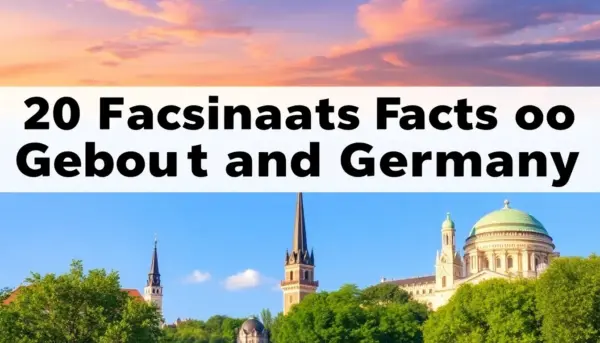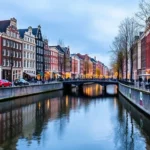Germany is a country rich in history, culture, and intriguing facts that often surprise both locals and visitors alike. From its enchanting castles to its world-renowned beer, exploring the curiosities of Germany opens a window into a unique and vibrant culture. Join us as we uncover 20 fascinating facts about Germany and its people that you may not have known!
Fascinating Celebrations and Traditions
1. The most internationally recognized German festival is undoubtedly the Oktoberfest. However, many are surprised to learn that it actually takes place in September! Initially celebrated in 1810 to honor the marriage of Prince Ludwig and Therese of Saxe-Hildburghausen, this festival has evolved into a global phenomenon and is now celebrated in various locations around the world. In Munich, where it originated, the beer served must adhere to the Purity Law of 1516, which mandates that it contains only water, barley, and hops.
2. While it’s easy to assume Germany is the world’s largest beer consumer, that title belongs to the Czech Republic. Germany, however, isn’t far behind, showcasing a deep-rooted beer culture that is integral to its identity.
Natural Wonders of Germany
3. The Black Forest (Schwarzwald) is Europe’s largest coniferous forest, serving as a paradise for nature lovers, hikers, and outdoor enthusiasts. In addition to the Black Forest, Germany boasts 15 national parks that highlight its breathtaking landscapes and diverse ecosystems.
Historical Insights
4. The story of Fanta is a surprising one. During World War II, Coca-Cola's German factories faced ingredient shortages, prompting them to create a new beverage using available resources. This innovation led to the birth of Fanta, its name derived from the German word "Fantasie," meaning fantasy.
5. If you’re a fan of castles, Germany is a dream come true. With thousands of castles scattered throughout the country, the most famous is undoubtedly Neuschwanstein Castle, which served as inspiration for Disney’s Sleeping Beauty Castle.
Industrial Prowess
6. Germany is a powerhouse in the automotive industry, home to major brands like Volkswagen, Audi, BMW, and Mercedes-Benz. However, the industry has faced its challenges, as evidenced by the Dieselgate scandal in 2015, where Volkswagen was caught manipulating emissions tests. Documentaries like Netflix's Dirty Money provide an in-depth look at this scandal.
Education and Accessibility
7. One of the remarkable aspects of Germany is its commitment to education. University studies are universally accessible and free, a policy that aims to ensure everyone, regardless of socio-economic background, can pursue higher education. This has led to a legacy of influential scientists, philosophers, and artists emerging from Germany.
Unique Driving Experiences
8. On many German highways, known as Autobahnen, there is often no speed limit, although it is advisable to adhere to the recommended speed limit of 130 km/h for safety reasons.
Culinary Contributions
9. When thinking of American cuisine, hamburgers and hot dogs come to mind, yet both have German origins. The name hamburger derives from the city of Hamburg, while hot dogs trace their roots to Frankfurt, where the famous frankfurter sausage was first made.
10. Speaking of sausages, Germany is home to a staggering variety of sausages, with currywurst being one of the most popular street foods. This dish, typically made with steamed or grilled sausages and served with curry ketchup, is a must-try in cities like Berlin.
Legal and Cultural Quirks
11. Interestingly, in Germany, it is not considered a crime to escape from prison. This reflects a belief that the quest for freedom is a fundamental human instinct.
12. Hamburg is one of the cities with the highest number of bridges in the world, boasting over 2,000 bridges – even more than Venice!
Language and Communication
13. The German language is notorious for its complexity, and even fluent speakers find difficulty with its longest word, which contains 79 letters: Donaudampfschiffahrtselektrizitätenhauptbetriebswerkbauunterbeamtengesellschaft. This tongue-twister translates to “Association of Subordinate Officials of the Main Maintenance Building of the Electric Transport of the Danube Steamship,” a mouthful even for the most adept linguists!
Social Etiquette
14. If you ever want to annoy a German host, here are three things to avoid:
- Arriving late (punctuality is highly valued).
- Entering their home without removing your shoes (it’s customary to do so).
- Ignoring recycling rules (Germans take environmental responsibility seriously).
Festive Traditions
15. With the holiday season upon us, it’s worth noting that Germany is credited with the invention of the Christmas tree. The early decorations included fruits, cookies, and sweets, setting the stage for the festive traditions we celebrate today.
Innovations and Influences
16. Germany has a long history of innovation, having been the birthplace of numerous inventions, including the first automobile, aspirin, the printing press, the bicycle, the MP3 format, and the electric drill, showcasing its significant contributions to technology and science.
17. Home to the world’s tallest church, the Ulm Cathedral reaches a height of 161 meters, a stunning architectural feat that attracts visitors from around the globe.
The Flag and Its Symbolism
18. The German flag consists of three horizontal stripes: black, red, and yellow. These colors trace their origins to the uniforms of German soldiers during the Napoleonic Wars (black uniforms with red decorations and yellow buttons). Interestingly, Hugo Boss was the designer of the Nazi uniforms, a fact that adds complexity to the narrative of Germany’s history.
Tongue Twisters and Language Fun
19. Another challenging German tongue twister is: “Fischer Fritze fischt frische Fische; Frische Fische fischt Fischer Fritze”, which translates to “Fisher Fritze fishes fresh fish; fresh fish is fished by Fisher Fritze.” It’s a playful example of the intricacies of the German language!
The Berlin Wall: A Historic Divide
20. The Berlin Wall famously divided the city for nearly 30 years, yet it was constructed overnight on August 12-13, 1961, initially beginning as a simple barbed-wire fence. Its creation was hastened by a question posed by an Italian journalist to the spokesperson of East Germany, marking a pivotal moment in history. For those interested in learning more, there are numerous resources detailing the history of the Berlin Wall and its significance.
Did you know about these curiosities of Germany? Do you have any interesting facts about Germany or its people that you’d like to share? With these insights, hopefully, you now have a deeper understanding of this remarkable country and its rich tapestry of history and culture.
To further explore Germany's fascinating culture, check out this video:




